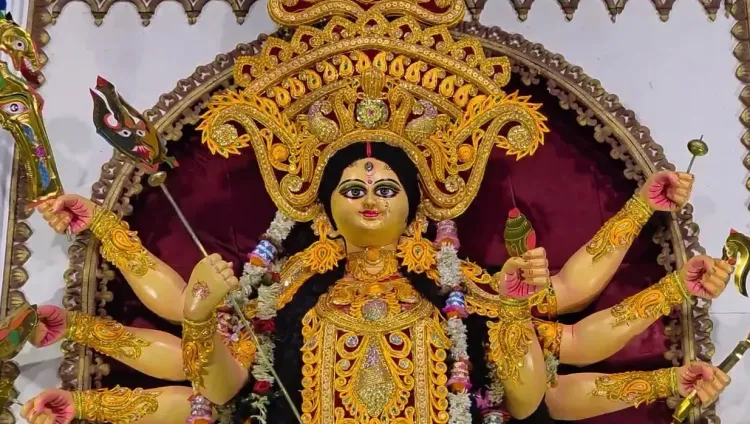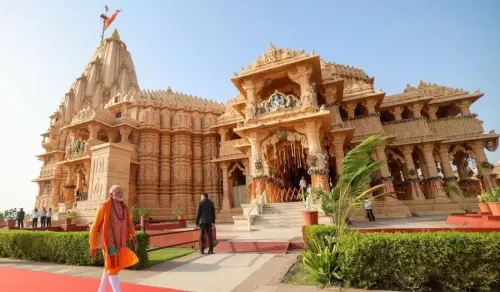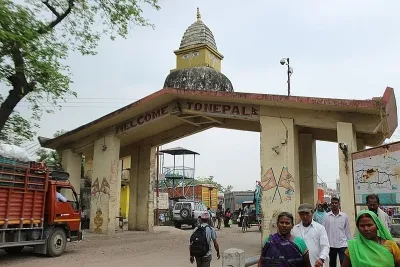How is West Bengal celebrating Maha Ashtami?

Synopsis
Key Takeaways
- Maha Ashtami is a vital day in the Durga Puja festival, symbolizing the triumph of good over evil.
- Devotees across West Bengal engage in heartfelt rituals and community celebrations.
- Unique local traditions enhance the festive spirit in various regions.
- The day serves as a reminder of inner strength and resilience.
- Worshipping Maa Mahagauri brings peace and tranquility to devotees.
Kolkata, Sep 30 (NationPress) Maha Ashtami, a day of profound significance in the Durga Puja festival, is being celebrated across West Bengal with profound reverence on Tuesday. Devotees gathered in large numbers at temples and puja pandals throughout the state, including Murshidabad, Kolaghat, East Midnapore, and Kolkata, to offer prayers and engage in rituals honoring Goddess Durga.
In Murshidabad, the Ashtami Durga Puja was organized by the Arunachal Durga Puja Committee, a remarkable initiative led by women. Devotees flocked to participate in the puja ceremonies, offering their prayers with heartfelt devotion.
In Kolaghat, the celebrations featured enthusiastic participation from the locals. The fifth edition of the Durga Puja, organized by the villagers of Pulashita, is renowned for its distinctive rural-themed pavilion decorations, crafted entirely by the villagers. From early morning, hundreds of devotees visited the puja mandaps, eager to participate in the rituals and offer their prayers. The atmosphere was filled with vibrant chants and devotional songs, as worshippers performed traditional rites in honor of the Goddess on this auspicious day.
Ashtami Puja in East Midnapore commenced at multiple puja pandals, witnessing a steady flow of devotees offering floral tributes and prayers. The Kanthi Nandanik Durgotsav Committee’s puja mandap was notably crowded, with many paying homage to Goddess Durga. Interestingly, state Opposition leader Suvendu Adhikari is expected to visit this pandal to pay his respects.
The state capital, Kolkata, experienced a massive turnout for the Ashtami Pushpanjali, a critical ritual during Durga Puja. Maha Ashtami signifies the third day of the Sharadotsav celebrations, with crowds gathering at various puja pandals across the city from the early hours, holding Belpatra and flowers as offerings. The devotion was palpable as long lines formed outside even the largest pandals, with families, friends, and relatives uniting to worship Goddess Durga.
To accommodate the overwhelming crowds, numerous pandals arranged for prayers to be conducted in multiple phases throughout the day. The city was alive with festive energy, the rhythmic sounds of traditional Dhak drums echoing through the air, accompanied by the chanting of hymns and mantras, enriching the spiritual ambiance of the day.
The festival spirit extended beyond West Bengal, reaching Vijayawada, Andhra Pradesh, where Durga Ashtami was celebrated with equal devotion. Temple priest Venkateshwara Shastri described the day as “auspicious and significant for receiving the blessings of Goddess Durga, who alleviates poverty, sorrow, and fear, granting prosperity and victory to her devotees.”
On this occasion, Shastri highlighted the spiritual significance of Durga Ashtami, stating, “On this sacred day, countless devotees receive the divine grace of Goddess Durga. The Mother, who eternally blesses sages, seers, and incarnate beings, showers her compassion upon all who seek her. Thus, the eighth day of Navaratri is gloriously recognized as Durga Ashtami.”
He continued, “Worshipping and beholding Goddess Durga on this day helps eradicate all forms of poverty, sorrow, and fear, ushering in prosperity, auspiciousness, and endless victory. May everyone seeking the Mother be liberated from suffering and attain divine blessings, eternal auspiciousness, and supreme success.”
Maha Ashtami conveys a profound message that transcends religious rituals, reminding devotees to recognize their inner strength and confront life’s challenges with courage. As Goddess Durga triumphed over darkness and evil, devotees believe this day empowers them to conquer personal struggles, fears, and doubts.
This day carries particular significance as it commemorates Goddess Durga’s conquest over the demons Chanda, Munda, and Raktabija, symbolizing the victory of good over evil. Devotees also venerate Maa Mahagauri, an incarnation of Adi Shakti, embodying purity, serenity, and tranquility. Revering Maa Mahagauri on this day is believed to bestow peace and spiritual calmness upon her followers.










